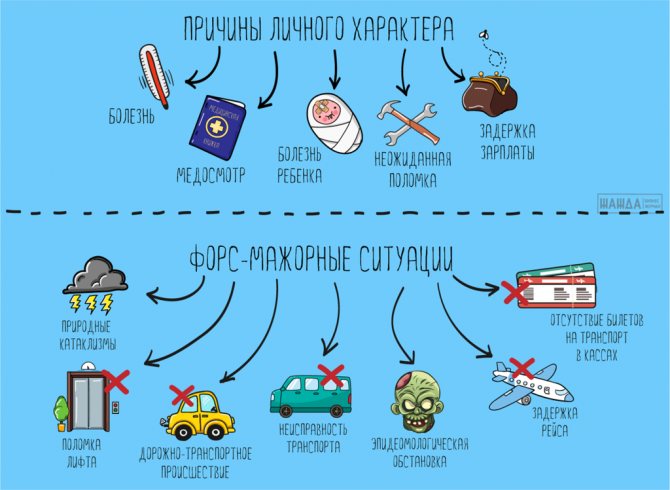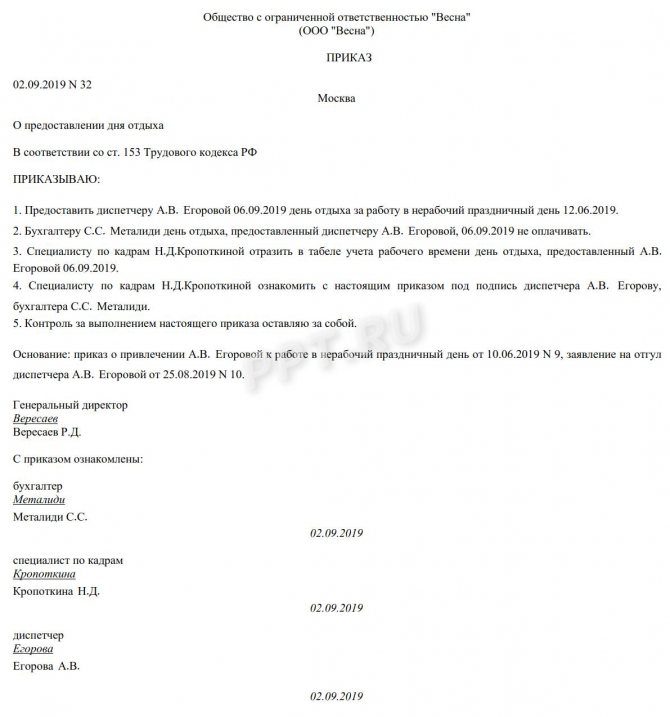If a person was absent from the workplace for less than 4 hours, this is not legally considered absenteeism and cannot be punished by dismissal. However, even a short-term absence can lead to undesirable and even fatal consequences. Therefore, the head of the department or the employer has the right to draw up a report on such absence and subject the culprit to disciplinary action. Repeated repetition of such incidents may well become a reason for parting with an employee. The most common occurrences are lateness, leaving work earlier and returning late from lunch break.
For the correct legislative registration of such situations, it is necessary to require an explanatory note from the employee who was absent from his workplace. After all, it may turn out that the reasons for absence were completely valid, and there is nothing to punish the employee for. In any case, it is necessary to write this document.
- Form and sample
- Free download
- Online viewing
- Expert tested
FILES
What is considered truancy?
Absenteeism is considered to be the absence of an employee from work for more than 4 hours in a row, but provided that lunch time, which is due to the person by law, has been deducted.
A period of absence less than the specified period must be recognized as late. Truancy is divided into two categories:
- Without good reason. Such absenteeism may result in dismissal unless the employer imposes another punishment on the employee.
- For a valid reason, when a person was forced to be absent.
In practice, situations often arise when the employer does not recognize the employee’s arguments as valid and dismisses him. Then the employee can go to court and appeal the decision.
Possible and impossible (according to the Labor Code of the Russian Federation)
Although any employer dreams that all his employees are always in their places during working hours, in life this is impossible. Every employee is a living person, and from time to time circumstances arise that force him not to go to work.
What types of absence from work exist:
- different types of leave: regular, at your own expense, child care, educational and others;
- time off;
- absenteeism.
The first two cases were agreed upon with the employer, the last is a violation of labor discipline and is fraught with serious consequences for the employee, including dismissal.
If an employee manages to justify his absence from work, this will not be recognized as absenteeism. And if by this time a disciplinary sanction has already been imposed, it is subject to cancellation.
The employer needs to be very careful, since the Labor Code of the Russian Federation does not contain a list of valid reasons for absence from work, and unjustified disciplinary action and dismissal are a violation of the employee’s rights, as a result of which he will most likely go to court, and the court will reinstate his rights .
Valid reasons for absenteeism
By analyzing the circumstances of modern life, it is possible to determine some valid reasons for the absence of an employee.

Personal reasons
1. Illness or injury.
Absenteeism is due to the health of an employee when a person goes to the hospital, but does not take out a sick leave sheet. Many people give up sick leave in order to maintain wages. In this case, the employee must provide a doctor’s certificate indicating the date of the appointment.
2. Medical examination.
If a person works in a grocery store, child care facility, catering, military, fire or rescue service, then a medical examination is a mandatory procedure, and the absence of an employee cannot be considered absenteeism. But if the employee prescribed a medical examination for himself and did not bring a doctor’s certificate, then this can no longer be considered a valid reason.
If an employee refused to issue a sick leave or was undergoing a medical examination, he must provide a doctor’s certificate.
3. Illness of a child or other family member.
This fact must be confirmed by a doctor’s certificate or taken sick leave to care for the child.

4. Unexpected breakdown in utilities.
These reasons include a gas leak, a broken heating or water supply pipe, an electrical short circuit, or a fire.
5. Participation in government processes.
The reason for absenteeism is considered valid if the employee is in court on a subpoena, for example, as a plaintiff, witness, juror or representative of the election commission. According to Art. 46 of the Constitution of the Russian Federation, such a reason is considered valid, because a person has the right to personal participation in court.
6. Delay of salary.
Delay in salary payments for more than 15 days can also be a valid reason. An employee has the right not to go to work, but must notify the employer in writing. According to Part 2 of Art. 142 of the Labor Code of the Russian Federation, absence may continue until at least part of the salary is paid.
Reasons for absenteeism caused by external factors
The circumstances for absenteeism may not be related to personal reasons. Anything that can be classified as a force majeure situation justifies a person’s absence from work for 4 hours or more.
Force majeure situations:
- Elevator breakdown in a building - an employee got stuck in the elevator and was unable to come to work.
- Road traffic accident.
- Transport malfunction if it is not possible to transfer to another bus, trolleybus, etc.
- Natural obstacles (flood, ice, strong gusts of wind).
- Epidemiological situation in the locality and mandatory vaccination.
- Flight delay, which creates barriers to timely return home from vacation, business trip or other trip.
- Lack of tickets at the ticket offices of any road, water or air services.
If the employee has confirmation that the absence was due to serious circumstances, then you cannot fire him.

Reasons for absenteeism that are known in advance
Sometimes the reason for absenteeism may be other circumstances that arose the day before or were known in advance. Such reasons include a wedding, the birth of a child, or the death of a close relative.
The employee also has the right to receive additional days off, which are not paid by the employer and cannot be considered absenteeism. But the employee is obliged to warn the manager about these circumstances in writing; if this is not possible, then you can simply call. According to Art. 128 of the Labor Code of the Russian Federation, the period of absence from work cannot exceed 5 days.
An employee has the right to receive additional days off, which are not paid by the employer and cannot be considered absenteeism.
Absenteeism does not always happen at the will of the employee. Sometimes a person is forced to stay late or not come to work at all due to unforeseen circumstances. But if there is a justification for absenteeism and it is valid, then you do not have the right to exceed your authority and deprive the employee of work. Before issuing a dismissal order for absenteeism, give the subordinate the opportunity to justify himself.
When is it possible
The employer is forced to decide for himself what is considered a valid reason for absence from work and what is not. And the employee has the right to disagree with him, then the matter may go to court.
There is a list that the court relies on when deciding such issues. The Labor Code considers absence due to illness as one of them, but subject to the provision of a document from a medical institution.
The following are also considered valid reasons:
- performing public works;
- donation of blood and components;
- participation in a strike;
- transport problems - flight delay, car accident, etc.;
- force majeure, for example, disasters, natural disasters, military actions and others;
- detention;
- absence from work due to a delay in wages lasting more than 15 days (with prior notification by the employee to the employer).
From a practical point of view, it is more correct when an employee’s absence from work is agreed upon in advance with the employer. This is the case when a person, going on vacation or planning to take time off to which he is entitled, writes a statement about this.
According to the law, an employee is entitled to time off if:
- went to work on non-working days;
- donated blood and components;
- he has irregular working hours;
- is going to undergo a medical examination (one day every three years, and for employees of pre-retirement age - two days every year) or a mandatory periodic medical examination;
- intends to participate in the court hearing as a juror.
In response to the application, the employer issues an order.

Most employers are sympathetic to absences for family reasons:
- the need to care for a sick family member, most often a child;
- local utility failure at the place of residence;
- death of a close relative;
- wedding;
- moving;
- birth of a child, etc.
To avoid problems, we strongly recommend that you develop and communicate to your employees rules of conduct in such cases. If there is a risk of absence from work, the employee is obliged to inform his supervisor, and then he will receive instructions on what to do in this case so that his absence does not become absenteeism, for example, take some supporting documents. In many organizations, it is possible to work remotely, for example, if a child is sick. Whether or not to take sick leave in this case is discussed separately. It is important that employees know how to act to avoid problems.
What is disciplinary action
The Labor Code of the Russian Federation provides for three types of disciplinary sanctions of varying degrees of impact for guilty misconduct of full-time employees, namely:
- comment;
- rebuke;
- dismissal at the initiative of the employer or for other legal reasons.
Dismissal for absenteeism is a disciplinary sanction, but is not a necessary consequence of absenteeism. Indeed, when choosing a measure of responsibility in relation to an employee, one should take into account the severity of the act committed and the circumstances under which it was committed.
Absence due to illness
In accordance with Article 373 of the Labor Code of the Russian Federation, during periods of temporary incapacity for work, the employee retains his place of work (position). And Article 81 of the Labor Code of the Russian Federation states that the dismissal of an employee during a period of temporary disability at the initiative of the employer is not allowed, except in cases where the organization is liquidated or the entrepreneur ceases its activities.
It follows from this that the employee’s illness is a valid reason for his failure to fulfill his work duties, and under such circumstances he cannot be dismissed at the initiative of the employer. Whereas in the situation from the commented letter, the employer, before dismissing the employee, was not convinced that the reason for his absence from work was disrespectful (letter of the Ministry of Labor of Russia dated November 7, 2019 No. 14-2/B-912).
Consequently, the employer did not strictly follow the procedure enshrined in Article 193 of the Labor Code of the Russian Federation. This means that the employee can challenge the dismissal on the grounds that in the event of temporary incapacity for work, he could not exercise his right to provide an explanation. When making a decision, the court will check the employer’s compliance with the dismissal procedure under the Labor Code of the Russian Federation and, most likely, will recognize the dismissal as illegal after requesting written explanations from the employee during the period of his temporary disability (Review of the practice of courts considering cases on disputes related to the termination of an employment contract at the initiative of the employer, approved Presidium of the Supreme Court of the Russian Federation 12/09/2020).
Can leaving work due to poor health be considered absenteeism?
According to Art. 21 and 214 of the Labor Code of the Russian Federation, an employee must immediately inform his immediate supervisor about a deterioration in his health, including the manifestation of signs of an acute occupational disease. In Russian judicial practice, there is a case where the court of first and appellate instances recognized as legal the dismissal of an employee who did not notify the employer of poor health and left the workplace before the end of the shift. However, the Supreme Court (SC) of the Russian Federation overturned their decision and ruling and returned the case to the court of first instance.
Question answer
Is it possible to refuse a remote transfer? This is stated in the Ruling of the Supreme Court of the Russian Federation dated August 17, 2021 No. 57-KG20-9-K1. It follows from the document that leaving work due to poor health without warning cannot always be considered absenteeism. The Supreme Court believes that when considering such an issue, the reasons (good or bad) for the employee’s absence from the workplace must be established.
The Supreme Court demanded that the court of first instance find out what caused the employee to leave the workplace early, whether this reason was valid, and why the employee did not notify the employer. In addition, it was necessary to check the validity of the employer recognizing the reason for the employee’s absence from the workplace as unexcused. And also whether the employer, when dismissing him, took into account the severity of this offense, the circumstances in which it was committed, the previous behavior of the employee and his attitude to work.
The ruling states that the court of first instance, instead of these significant legal circumstances, mistakenly believed that what was important for the case was, first of all, that the employee did not notify his immediate or superior manager about the deterioration of his health and the need to leave his workplace before the end of the work shift. However, “the court is obliged to examine essentially all the factual circumstances and does not have the right to limit itself to establishing formal conditions for the application of the rule,” the document says.
When considering the case of reinstatement of a person dismissed for absenteeism, it is the employer who is obliged to prove that the employee committed a gross violation of labor obligations. In a specific case, the employee indicated in the statement of claim, in written explanations to it and in the appeal against the decision of the court of first instance that there were good reasons for leaving his job. He argued that during his work shift he felt severe pain in his leg, and the deterioration in his health was sharp and sudden. The man left his workplace because he began to fear the life-threatening consequences of an exacerbation of his post-thrombotic disease.









